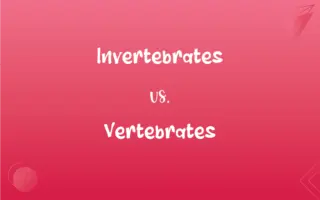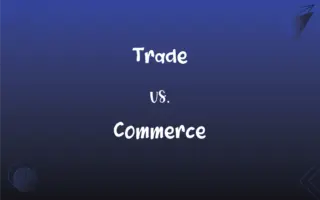Invoice vs. Receipt: What's the Difference?
Edited by Aimie Carlson || By Harlon Moss || Updated on July 29, 2024
An invoice is a request for payment, while a receipt confirms payment has been received.

Key Differences
An invoice is a formal document sent by a seller to a buyer, indicating the products, quantities, and agreed prices for products or services. On the other hand, a receipt is a document that acknowledges the receipt of a certain amount of money for goods or services.
An invoice typically contains terms of payment, such as how long the buyer has to pay for the goods or services (e.g., net 30 days). The receipt, however, doesn’t typically carry this information but instead provides proof that a payment has taken place, and often details how it was made (e.g., cash, credit card).
The main objective of an invoice is to notify the buyer of their obligation to pay. It's almost like a polite reminder. Conversely, a receipt is all about confirmation. When you get a receipt, it's an affirmation that a particular transaction has taken place.
While the invoice is generated before payment, indicating what is due, the receipt comes after the payment as an acknowledgment. Both invoice and receipt play crucial roles in the accounting process, but their purposes are distinctly different.
Comparison Chart
Definition
Request for payment
Confirmation of payment
ADVERTISEMENT
Timing
Issued before payment
Issued after payment
Purpose
To notify the buyer of their obligation to pay
To confirm and acknowledge receipt of payment
Typical Information
Product details, quantities, terms of payment
Payment method, amount received, date of payment
Importance in Accounts
Used to record accounts receivable and sales
Used to record income and cash received
Invoice and Receipt Definitions
Invoice
A statement of transaction detailing what is owed.
I received an invoice for the conference registration fee.
ADVERTISEMENT
Receipt
Proof of a transaction having taken place.
She kept the receipt as proof of her purchase.
Invoice
A document requesting payment for goods or services.
She sent an invoice for the work she completed last month.
Receipt
A document confirming payment has been made.
After paying the bill, the waiter handed me the receipt.
Invoice
A written record of a transaction to be settled.
The publisher would invoice the bookstore for the books supplied.
Receipt
A written acknowledgment of having received money or goods.
He provided a receipt after I paid for the meal.
Invoice
A commercial document indicating both the seller and the buyer.
The invoice clearly stated the names of both the supplier and the customer.
Receipt
A record of money received during a particular period.
The cashier tallies all the receipts at the end of the day.
Invoice
An itemized bill showing the list of goods or services provided and their prices.
The invoice listed all the items he had ordered.
Receipt
A slip of paper or electronic document that provides details of a financial transaction.
The receipt showed the date, amount, and method of payment.
Invoice
A detailed list of goods shipped or services rendered, with an account of all costs; an itemized bill.
Receipt
The act of receiving
We are in receipt of your letter.
Receipt
The fact of being or having been received
They denied receipt of the shipment.
FAQs
Can an invoice act as a receipt?
No, an invoice is a request for payment, while a receipt confirms payment has been received.
What is an invoice?
An invoice is a request for payment issued by the seller to the buyer for goods or services provided.
Can an invoice be electronic?
Yes, electronic or e-invoices are becoming increasingly common and are valid like paper invoices.
When is a receipt given?
A receipt is given after a payment has been made as confirmation.
Is an invoice legally binding?
Yes, an invoice can serve as a contract and is legally binding, requiring the buyer to pay the stated amount.
Do all purchases require a receipt?
Not all purchases require a receipt, but it's good practice for businesses to provide one for transparency and record-keeping.
What should I do if I find a discrepancy in my invoice?
If there's a discrepancy in your invoice, contact the seller or service provider to address the issue.
Can I get a receipt if I lost the original?
Some businesses can provide a duplicate receipt upon request, but it's always good to keep the original safe.
What details are commonly found on a receipt?
A receipt typically shows the date, amount paid, method of payment, and items purchased.
Is a receipt necessary for tax deductions?
Yes, a receipt is often required to claim tax deductions as it serves as proof of the expense.
Do invoices have expiration dates?
Invoices don't expire, but they do have due dates indicating when the payment is expected.
Why is it important to keep receipts?
Receipts provide proof of payment and are important for accounting, tax purposes, and potential returns or disputes.
What's the difference between an invoice number and a receipt number?
An invoice number identifies a specific bill, while a receipt number tracks a specific payment.
Can a receipt be handwritten?
Yes, as long as it includes essential details, a handwritten receipt is valid.
Why do some invoices include tax?
Taxes on invoices are levied based on regulations and vary by jurisdiction. The seller collects it on behalf of the government.
Are invoices and receipts required for all businesses?
While requirements vary by jurisdiction, most businesses use invoices and receipts for transparency, record-keeping, and compliance.
Who issues the invoice?
The seller or service provider issues the invoice to the buyer or client.
Who provides the receipt?
The person or entity receiving the payment provides the receipt.
Is it mandatory to provide a receipt for cash transactions?
While not always mandatory, providing a receipt for cash transactions is a good practice to confirm payment and keep accurate records.
What happens if an invoice is not paid?
If an invoice is not paid, the seller can take legal action or send the account to collections.
About Author
Written by
Harlon MossHarlon is a seasoned quality moderator and accomplished content writer for Difference Wiki. An alumnus of the prestigious University of California, he earned his degree in Computer Science. Leveraging his academic background, Harlon brings a meticulous and informed perspective to his work, ensuring content accuracy and excellence.
Edited by
Aimie CarlsonAimie Carlson, holding a master's degree in English literature, is a fervent English language enthusiast. She lends her writing talents to Difference Wiki, a prominent website that specializes in comparisons, offering readers insightful analyses that both captivate and inform.






































































